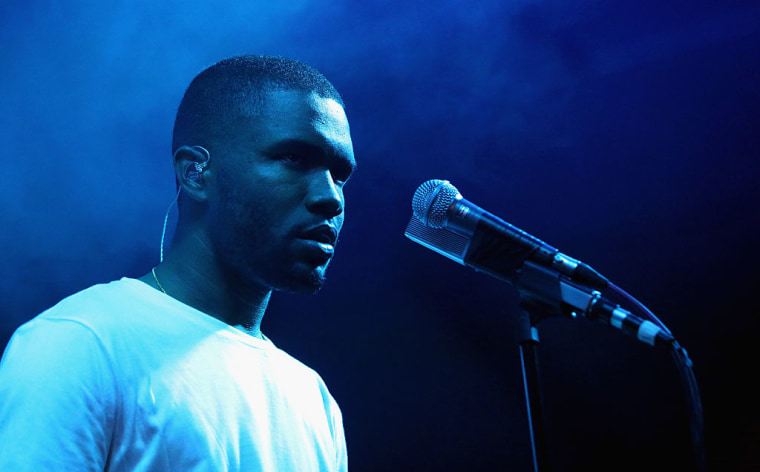Since his debut studio album, 2012’s "Channel Orange," legions of Frank Ocean fans waited for his new album with bated breath. Ocean’s fandom isn’t a massive membership-type spectacle like that of Beyonce’s Beyhive, but the following is just as fierce. He’s been the perfect model of carefree Black masculinity and has made so many queer and bisexual men of color feel less isolated and more valued.
Frank Ocean is on a different wave, and that’s why we love him. He’s enigmatic and is an artist more than an entertainer. He’s been conspicuously absent from social media all the while setting the internet ablaze with rumored release dates and possible titles of his sophomore effort. When his album "Blonde" finally dropped last week, a whole swath of queer Ocean fanatics let out the proverbial breath they all were holding.
"Frank Ocean is the voice of a different kind of Blackness. The queer Black that hyper-masculine crooners and rappers don’t represent but like to appropriate."
He represents the Black queer creative muscle that influences and pushes a very heteronormative and often homophobic Black music scene to be more expansive, complicated and nuanced with its art. He’s carved a place for himself that can’t be contained or defined by any genre -- just as many queer people can’t be sequestered at one place on the spectrum of gender or sexuality. And I don’t mean gender and sexuality as just how you identify or whom you desire, respectively, but how you are. A cornerstone of the collective queer consciousness is challenging how our femininity and masculinity show up and how determined we are at expressing ourselves.
Blackness and masculinity can both be performances. When they intersect in music, particularly hiphop and R&B, it’s more about conquest or competition as the crux of an experience.
Frank Ocean is the voice of a different kind of Blackness. The queer Black that hyper-masculine crooners and rappers don’t represent but like to appropriate. Frank doesn’t make “classic” or respectable Black music. He skews what it is and makes it his own. The songs on this album cross the lines between ethereal trance house (“Pretty Sweet”) to folk (“Self Control”) to hiphop melodiousness (“Nights”).
"Frank Ocean is us. He’s haunted and emotional. Bored of the binary and the ordinary."
Ocean is a storyteller, and the different melodies tell a different story. He tells the story of summertime late nights and early mornings. The nights you barely remember but build bonds unbreakable. The whole album feels like crowded rooftops hours before the sun rises; strobe lights that blink so fast the crowd looks like slow motion, dark corners and thick hookah smoke. Frank’s flat, passionate voice with it’s unique gravelly quality is reminiscent of Keith Sweat. On “Self Control” the strain in his pitch is like an extended hand. The echoing plea “I know you gotta leave/ take down some summer time/ give up tonight” is perfect for summer love that fades into the sunset as we barrel down for the fall. Out of the 17 cuts is a smattering of one-minute prose and dialog over short bursts of experimental arrangements filling in spaces and further pushing the boundaries of how a song is supposed to organize.
Many aspects of these projects speak to the culture of resistance, non-conformity and expansion that the queer community is immersed in now. The vibrating awakening that the Black queer kids have guided and inspired, is influencing the way art is distributed and the relationship between artists and audience. We’re rethinking radical approaches to recreating our body politic and divesting from systems.
Ocean released "Blonde" a day after he dropped his 45-minute visual album "Endless," fulfilling his contractual obligation to Def Jam. The way he outmaneuvered his label is emblematic of a larger energy and burgeoning efforts to uncouple our existence and art from oppressive, one-sided, greedy systems that have exploited and discarded black queer talent for too long. His art centralizes a queer sensibility while queer identity is still being navigated as a margin. It doesn’t feed the social media frenzy or follow a cookie cutter formula. His music betrays genres in the same way queers challenge gender. There are few gender signifiers in his love ballads but that doesn't make it any less poignant.
Frank Ocean is us. He’s haunted and emotional. Bored of the binary and the ordinary. He reminds us of the Black queer creative energy that is denied upfront but sampled, appropriated and used up by straight Black artists. There’s a soulfulness that seeps through his genre-bending songs that weaves it all together not seamlessly, but in a way that asks the listeners to think differently about the music they’re experiencing. "Blonde" and "Endless" are both interruptions that inspire. They are as limitless as they are honest. This latest effort is the perfect album to round out a hot summer and speak to celebration during a era of protests.

